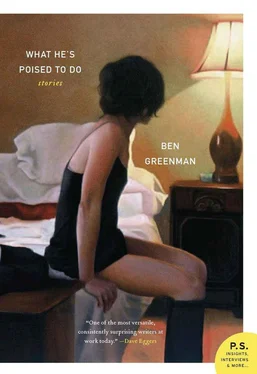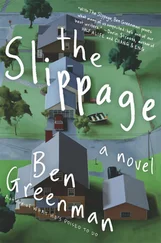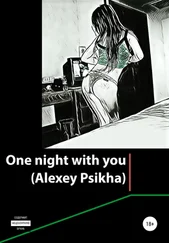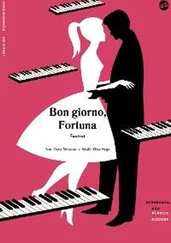And yet, there is a countermovement. Does she want my sadness? Is there not some danger of her feeling it as pity, or as an attempt to regain the power and control I lost when she turned me out romantically? Perhaps I am not the right person to feel sad for her. Perhaps indifference, while impossible, would be more appropriate. I do not know exactly, Jim, but I welcome your thoughts on the matter.
Yours,
Govindan
Rouse’s reply has survived.
My Dearest Govindan,
Your question is a hard one, which is why I am making no attempt to answer it.
My thoughts on the matter are the same as usual — I feel like fitting you for a priest’s collar and then pulling it tight around your neck until you are dead. It would be a merciful act, my friend, as you have rarely shown even the slightest inclination toward existing in the moment or on this good green earth, where blood courses through bodies until it finds expression in unmentionable articulations. Your head is in the clouds, as they say, and clouds are in your head. Down here on the ground, we live not by ideas but by impulses and consequences. For my part, I recently put a bun in the oven of a lovely little Belgian nurse. She is carrying high and believes that it will be a boy. Can I trouble you for a few Karmic Boomerangs? They are no longer available at toy shops or Hindu bookstores here in London, but I think the little nipper would enjoy them.
Love to Prabhavati,
Jim
Rouse did not take delivery of the boomerangs. Only six months after this exchange, he arrived at the academy to assume the duties of grounds manager and rugby coach, which had previously been performed by Andrew Eyre, who had departed for America. Rouse came without his Belgian girlfriend or his son. A note that Eyre wrote to Govindan at that time elaborates on the circumstances that brought Rouse to the academy. It is significantly more telegraphic than the other men’s letters: “Jim,” Eyre writes, “ran. I understand. Found out that the child wasn’t his, decided to stay and do his part. Passed through a change. Became a changed man. Then found out that the child was his after all. Some men would have been happy. Jim reasoned that any woman who would have been willing to have another man’s child was — well, Jim ran. Hope he’s good for rugby.” In fact, during Rouse’s time there, the institution earned far more renown for its athletics than it did for its moral and ethical instruction. The teams, whether in rugby or football, were extremely competitive, almost martial, and showed little mercy for their opponents. In fact, the marked contrast between the comportment of students in the classroom and on the field became central to the curriculum. One course dealing with the issue, taught by Govindan in 1929, was called “If you destroy an opponent, should you be eternally worried that your opponent will one day return to destroy you?”
The academy was shuttered in 1931, after a protracted lawsuit brought by the father of a former student who was injured during a rugby match; the suit held that Rouse’s style of coaching led directly to the injury. All of the academy’s remaining assets, including several dozen cases of boomerangs, were sold off to pay the settlement, as was the building itself, which became a community center and a museum dedicated to the history of the transcontinental border. Govindan, who had managed not to lose any of his personal wealth, moved to Sydney with his family — and Rouse, still single, came along. In Sydney, two months later, out walking along the waterfront and back, Govindan Ananthanarayanan encountered Louisa Pelham Bartlett, who had come to Australia after the death of her husband. The two of them resumed a friendship, and Govindan encouraged her to strike up a relationship with Rouse, who was occupying a small apartment in the back house of the Ananthanarayanan estate. “I know that this makes no sense to you, because it makes no sense to me,” he wrote to Eyre in 1933, “but I want to keep her near me, and I am hoping that if she takes up with Rouse it will achieve the desired effect. Desired effect: that is far too neutral and scientific a phrase for the almost childish joy I am hoping I might one day feel.”
It was not to be. Rouse was, by this time, a hard man, impossible to reason with, let alone love, and his abrasive manner drove Pelham Bartlett away from the Ananthanarayanan family. More to the point, it drove her out of Australia; she soon married an American businessman, who then moved to Kyoto. Rouse insisted that Pelham Bartlett’s departure did not bother him, as he had felt nothing for the woman when she was present. Nevertheless, he was keenly aware that his friend was suffering from her absence all over again, and this brought on a nervous breakdown that landed Rouse in Sacred Heart Hospital. “You didn’t want her around anyway,” Rouse wrote to Govindan from the hospital. “She had harmed you. Don’t you remember? Why would you want to keep ties with someone like that? I must confess I don’t understand you. But I am sorry if I have harmed you.”
After six months, Rouse was released, and he returned to the Ananthanarayanan home, where he began to work as a driver for the family. When Rouse heard in 1940 that his former girlfriend had died in a car accident, he was at the horse track with Govindan Ananthanarayanan. “A driver killed her?” Rouse reportedly said. “That evens the score.” He took off his driver’s cap, placed it over his heart, and lowered his head. “My failure to understand human cruelty,” he said, and began to laugh.
COUNTRY LIFE IS THE ONLY LIFE WORTH LIVING; COUNTRY LOVE IS THE ONLY LOVE WORTH GIVING

WE SET OFF FOR THE STATION THAT MORNING, LILY AND I. I know it pains you to hear this, my dear wife, but I feel I must tell the tale forward. You and I are one, in ways that we once discussed with regularity and even celebrated when you were my wife and I was your husband. Then we were divided. I am sorry, for I prefer love to war, but the truth is standing in the middle of the room and so I will not ignore it. The truth is your absence and Lily’s presence. I say “presence” euphemistically, when what I mean is something more specific. She is standing here, her dress not quite covering it.
We had been living in the city together for a little less than a year, Lily and I. Most of our time was spent in an apartment, exercising one another and dreaming of the day when we might start again in a finer place. I hadn’t known exactly what I meant by that, “a finer place,” until the postman delivered a letter written to Lily by an elderly friend of her parents, one Mrs. Pritchard. This fine woman had heard from Lily’s parents that Lily was looking for a place to spend part of the summer, and she was writing with a suggestion that took the form of a description of a village, and a road in it, and a house on that road that sounded like nothing so much as perfection. You and I once spent a summer in a village, but it was a dingy thing, with narrow paths that made movement through it nearly impossible. This village, as communicated by Mrs. Pritchard, sounded in me like a high note. Lily did not agree, but she did not have to; I heard her agreement in her silence.
At the train station on the morning of our departure, we were ringed by the denizens of the city that we had not, up until that very moment, met, and a more decrepit and disreputable crew I cannot imagine: There was a blind boy who could say only the words “more” and “money,” a crippled girl who tried to stay faithful to her innocent girlhood but was betrayed by the voluptuous flowering of her figure, and a man with a maimed hand who looked at the girl with a rude hunger that left no doubt as to the eventual destination of the hand. The deformities, both of body and of soul, came out of every corner of the station, and they reminded me of the small cottage in the seaside town where you and I stayed on our honeymoon. That was our village, and it was tolerable only because we went there with a hope that protected us from its reality. Do you remember? There were noises in the walls as something scuttled from left to right and top to bottom, like a text we were afraid to read. That was how I expressed it at the time, and you laughed and said that was too beautiful a conceit to waste on such an ugly sight. “The ugly is a component of the beautiful,” I said. You agreed. You were wrong, though you could not have known it at the time. The train station stands as proof of your error.
Читать дальше













